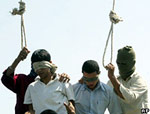 Observer: Hanging is the common method for execution in Iran. The judicial killings usually take place in the morning as the sun rises, often at the crime scene or in a city centre.
Observer: Hanging is the common method for execution in Iran. The judicial killings usually take place in the morning as the sun rises, often at the crime scene or in a city centre.
The Observer
Saeed Kamali Dehghan
 In Iran, the country I was born in and where I lived until three years ago, public hanging is a horrific but familiar scene for many, at least for those living close to city centres and public squares. Once as a child, on my way to school, I became an inadvertent spectator of an execution, my eyes shocked at seeing the guards draping a rope around the neck of a convict. The sight has haunted me ever since.
In Iran, the country I was born in and where I lived until three years ago, public hanging is a horrific but familiar scene for many, at least for those living close to city centres and public squares. Once as a child, on my way to school, I became an inadvertent spectator of an execution, my eyes shocked at seeing the guards draping a rope around the neck of a convict. The sight has haunted me ever since.
Hanging is the common method for execution in Iran. The judicial killings usually take place in the morning as the sun rises, often at the crime scene or in a city centre. The families of victims and convicts gather as the authorities prepare to hang the condemned from cranes.
Under Iran’s sharia law, the victim’s family has the right to spare the convict from execution for certain crimes, such as when someone is convicted of killing another person in a car accident. This means many executions see the condemned’s relatives incessantly pleading for a pardon. A huge crowd, which might include children, usually surrounds the scene.
Executions in Iran are mostly the result of grossly unfair trials which are usually held behind closed doors without the presence of a defence lawyer. Activists believe that many of those on death row were convicted on the basis of “forced confessions”, a method believed to be commonly used in the country at the moment. Moreover, when a death sentence is handed down, families are often not given prior notice of the execution.
A number of crimes such as murder and rape – and even homosexuality – can send a convict to the gallows, but it is the drug-related offences that accounted for more than 80% of the killings in the country last year. Latest figures on the number of executions that are known to have been carried out in 2011 globally indicate that half of the killings took place in Iran, although China, which considers the precise figures about its use of death penalty as a state secret, is not included in the calculation and still remains at the top of the list.
Iranian officials acknowledged the execution of only 360 people last year, but it is believed that this figure grossly underestimates the true number in the Islamic republic because the regime had allegedly embarked on a campaign of secret and mass hangings of prisoners, especially in faraway provinces.
Human rights organisations estimate that as many as 600 people were put to death in Iran last year, of which at least 488 executions were carried out for alleged drug offences. In the first half of 2011, Iran was executing at the rate of two people a day.
This year Amnesty said the authorities have so far acknowledged the execution of at least 182 people, 35 of them hanged in public.
“Amnesty International has received credible reports of 100 other executions which were not officially acknowledged, mostly of convicted drugs offenders,” the group said. Iran’s drug-related executions in 2011 showed a threefold increase from 2009, according to the human rights organisation.
Iran has also used capital punishment for foreign nationals, including Afghans imprisoned in the country for drug offences. As many as 4,000 Afghans are believed to be on death row, with concerns that they are particularly poorly treated.
The country’s judicial system has also been criticised for handing down death sentences against juveniles. In 2011 at least 143 child offenders were on death row in Iranian prisons, waiting to go to the gallows when they reach 18.


